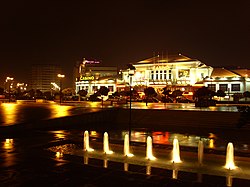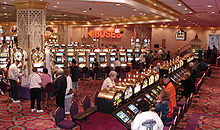Casino


A casino is, in the modern sense of the word, a facility that accommodates certain types of gambling activities. Casinos are often placed near or combined with hotels, restaurants, retail shopping, cruise ships and other vacation attractions. Some casinos are known for hosting live entertainment events, such as concerts and sporting events. Worldwide there are about 4750 casinos.[1]
History of the term casino
The term originally meant a small villa, summerhouse or pavilion built for pleasure, usually on the grounds of a larger Italian villa or palazzo. There are examples of such casinos at Villa Giulia and Villa Farnese. In modern Italian, this term designates a bordello (also called "casa chiusa", literally "closed house"), while the gambling house is spelled casinò with an accent.
During the 19th century, the term casino came to include other public buildings where pleasurable activities, including gambling and sports, took place. An example of this type of building is the Newport Casino in Newport, Rhode Island.
Not all casinos were used for gaming. The Copenhagen Casino was a theatre, known for the use made of its hall for mass public meetings during the 1848 Revolution which made Denmark a constitutional monarchy. Until 1937 it was a well-known Danish theatre.[2] The Hanko Casino at Hanko, Finland - one of that town's most conspicuous landmarks - was never used for gambling. Rather, it was a banquet hall for the Russian nobility which frequented this spa resort in the late 1800s, and is presently a restaurant. The Casino at the Blackpool Pleasure Beach amusement park in England, is a general entertainment complex that retains its original name from before the term came to be associated specifically with gambling.[citation needed]
Gambling in casinos

In most jurisdictions, gambling is limited to persons over the age of license (18 or 21 years of age in most of the United States[citation needed] and 18 to 21 in most other countries where casinos are permitted)[citation needed].
Customers gamble by playing slot machines or other games of chance (e.g., craps, roulette, baccarat) and some skill (e.g., blackjack, poker) (for more see casino games). Games usually have mathematically-determined odds that ensure the house retains a long term advantage over the players. This advantage is called the house edge. In games such as poker where players play against each other, the house takes a commission called the rake. Casinos often give out free items, known as comps to people who are gambling.
Payout is the percentage won by players.
Playing with house money refers to the situation where a winning player is placing bets with money that has been won from the casino.
Possible negative effects
Professor Earl Grinols of Baylor University has conducted studies that suggest casinos increase the number of pathological gamblers in a community. Through cost/benefit analysis, Grinols concludes that in order to have positive net economic effect, casinos would need to employ roughly 13% of a community of 100,000 people.[3]
Security


Casinos focus greatly on security. Large amounts of currency move through a casino, tempting people to cheat the system. Security today consists of cameras located throughout the property operated by highly trained individuals who attempt to locate cheating and stealing by both players and employees.
Modern casino security is usually divided between a physical security force, which patrols the casino floor and responds to calls for assistance and reports of criminal and/or suspicious activities, and a specialized surveillance department, that operates the casino's closed circuit television (known in the industry as eye in the sky) system in an effort to detect any misconduct by both guests and employees alike. Both of these specialized casino security departments work very closely with each other to ensure the safety of both guests and the casino's assets.
To maintain security, many modern casinos have rules forbidding interaction between staff in certain areas; for example, a dealer cannot talk with a cashier, for any time or reason, when not on duty. [citation needed]
When it opened in 1989, The Mirage was the first casino to use security cameras full time on all table games.[4]
See also

- List of casinos
- Casino game
- Locals casino
- Online casino
- American Gaming Association
- Global Gaming Expo
- Gaming Control Boards
- Gaming law
- Native American gaming
- European Gaming & Amusement Federation
Notes
- ^ "Worldwide Casinos, Horse Tracks and Other Gaming". Casino City. Retrieved 2007-07-09.
- ^ "Special catalogues in the Drama Collection". The Royal Library. Retrieved 2007-07-09.
- ^ Profesor Earl Grinols. "Gambling Economics: Summary Facts" (PDF). Retrieved 2007-07-09.
{{cite web}}: Unknown parameter|actualdate=ignored (help) Note: this page is a statement with no indication of the source of the data or how the results were determined. - ^ Knightly, Arnold M. (2007). "Blink and you'll miss him". Las Vegas Review-Journal: 1E. Retrieved 2007-07-09.
{{cite journal}}: Unknown parameter|month=ignored (help)
